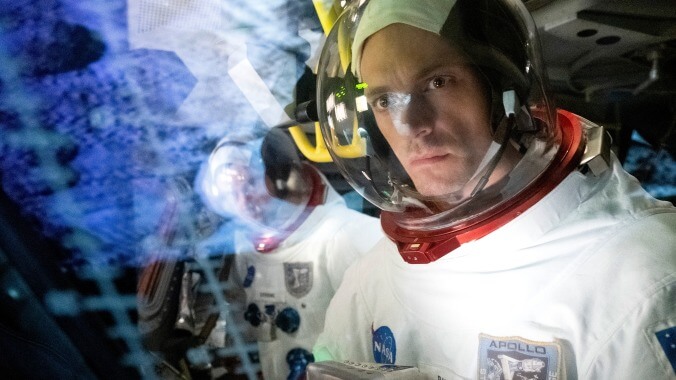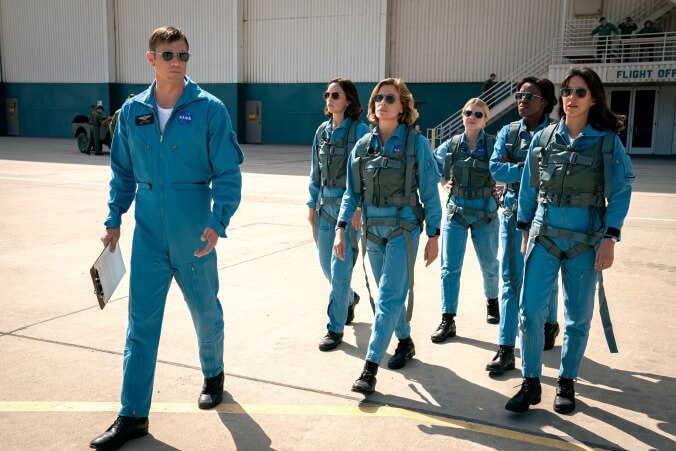For All Mankind is a rallying cry in TV series form


The vastness of space has never failed to spark the imagination; stories of what lies in the farthest reaches of the cosmos date back centuries, inspiring and inspired by explorers. But recent films like First Man and Ad Astra have taken a closer look at the business of space exploration—at both the minutiae of ascertaining who has “the right stuff” for takeoff, and the high costs, personal and financial, involved. Even more conscientious is Apple TV+’s For All Mankind, which lends equal weight to the questions of what’s to be gained and lost by venturing into space.
The series, from Ronald D. Moore, Matt Wolpert, and Ben Nedivi, has been described as science fiction, but in season one, that is meant to go only as far as presenting an alternate history. In this new drama, the year is 1969, President Richard Nixon is in the White House, and the Soviet Union has just won the race to the moon. The national mood here is low, and not just among thwarted astronauts like Neil Armstrong (Jeff Branson), Buzz Aldrin (Chris Agos), and Edward Baldwin (Joel Kinnaman). The Vietnam War has stretched on for years, and the country is still reeling from the assassination of Dr. Martin Luther King Jr. in 1968. But the air also fairly crackles with positive change; after the Civil Rights Act Of 1968, support is gathering for the Equal Rights Amendment. Women, including Black women like Danielle Poole (Krys Marshall), are finding their way into male-dominated fields like aeronautical engineering. Soon, we learn that the series’ early defeat, which was broadcast to hundreds of millions people, was only a temporary one.
For All Mankind’s alternate history doesn’t get a real boost until after the first two episodes; until then, much of what we’ve learned in history books comes to pass. Nixon, who appears in archival photos and footage, but is otherwise only heard in recordings, some fictionalized, threatens and maneuvers, and gender conventions are enforced by men and women alike, including Ed’s wife Karen (Shantel VanSanten). Moore, who has taken viewers on trips through time and bleak realities on Outlander and the rebooted Battlestar Galactica, shows considerable restraint early on, creating more ripples than waves in the timeline. But as season one unfolds, the far-reaching effects of those little disruptions begin to take shape; barriers gradually fall away as journeying through space becomes a common goal for astronauts, engineers, the president, journalists, civilians—you know, for all mankind.
The Johnson Space Center in Houston serves as the hub of activity for much of the first season. In addition to astronauts like Ed Baldwin and Gordo Stevens (Michael Dorman), who were aboard Apollo 10, we meet Margo Madison (Wrenn Schmidt), a NASA engineer who is mentored by Wernher von Braun (Colm Feore), just one of many historical figures who populate the series along with analogues and original characters. There’s Deke Slayton (Chris Bauer), the gruff but warm Director of Flight Crew Operations. Danielle, who was once a human computer at NASA, joins Tracy Stevens (Sarah Jones), Molly Cobb (Sonya Walger), and Ellen Waverly (Jodi Balfour) in a program designed to put the first American woman on the moon. The Johnson Space Center even becomes a place for Aleida Rosales (Olivia Trujillo), a young Mexican immigrant, to map out her own dreams for a space voyage.
The strains of having such a huge cast are noticeable; it’s clear that several players, including Aleida, will play a greater role in the future, but the foreshadowing in her storyline doesn’t amount to much more than that. Season one spans several years, which is how long the wait to see Molly or Danielle, who is one of only a few non-white named characters, again can feel. Even with such a sprawling cast, For All Mankind relies on Ed as an entry-point character for longer than is strictly necessary. Kinnaman, who’s following up a solid turn on Amazon’s Hanna, does great work here as a man who doesn’t think there’s any such thing as paying too high a price to advance the space program. Early on, Ed almost forfeits his chance at a space shuttle mission, but he’s quickly brought back into the fold. That’s great for Ed, not so much for the show’s forward-thinking ways. Though the focus frequently changes, switching over to see how Karen is holding things together at home or how Tracy is dealing with the competition of being one of “Nixon’s women” (in the space program), more often than not, it remains on Ed and Gordo and Deke and von Braun.
That could just be chalked up to the time period, and the show’s longer arc is most likely bending toward a future where women like Danielle and girls like Aleida are as inspiring of figures as Sally Ride. Nonetheless, it undermines the show’s boldness to tease a vastly different past, only to recreate much of it. Worse, although sexism and restrictive gender norms are regularly called out, there’s little intersectionality; Danielle makes a single joke about being “the token black girl” in the female astronaut program, but beyond a couple of comments in the second episode, racism is hardly addressed. The show mostly glosses over race in revisiting or referring to historical events: Dr. King’s assassination by a white supremacist isn’t mentioned, nor are the subsequent protests in Chicago, but the calling of the National Guard against protestors at the 1968 Democratic National Convention is. It’s unclear if For All Mankind is applying progressive ideals retroactively or if the writers are skirting the issue, but it’s not enough to simply have Black and Latinx characters in a story with predominantly white characters. Their inclusion should include the proper context, not just for accuracy’s sake, but so we can better appreciate the journeys of characters like Danielle, Aleida, and Aleida’s father Octavio (Arturo del Puerto).
As exciting as it is to have Moore at the helm again, his vision here is in danger of looking quaint compared to the rest of Apple TV+’s offerings at launch, not to mention the rest of the streaming and network landscape. A lot of detail (and money) went into For All Mankind’s production, from the archival footage that opens most episodes to the fondue set in the Baldwin home to the replica set of the Mission Control. Most of the sequences shot in space are either dizzying or dazzling (though the effect is lessened by the fact that Apple TV+ doesn’t allow for full-screen viewing on a laptop). But unless you’re the type to go have gone to space camp (we exist), there’s no immediate hook, nothing that quite screams “Mad Men set at NASA,” as the show was originally framed. There is conflict and love and ambition in the lives of these astronauts, would-be astronauts, and their families. Above all else, there is hope: the palpable sense of hope from the earliest days of the real-life space program, the kind of hope that has kept Americans fighting for ratification of the Equal Rights Amendment, and the hope that divisions can be bridged by a common goal. That tantalizing vision could be, to borrow from another innovation-fueled period drama, “the thing that gets us to the thing”—a drama that’s as compassionate as it is compelling. At the very least, there’s hope for For All Mankind.